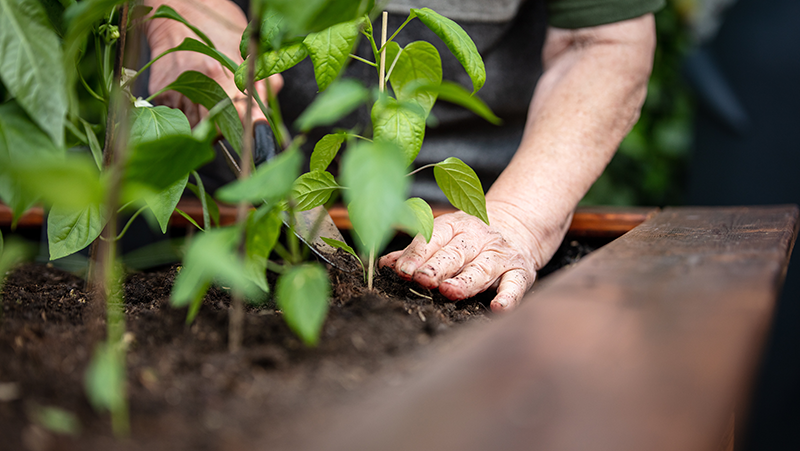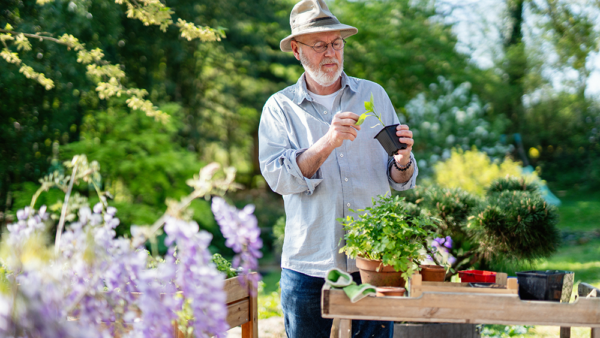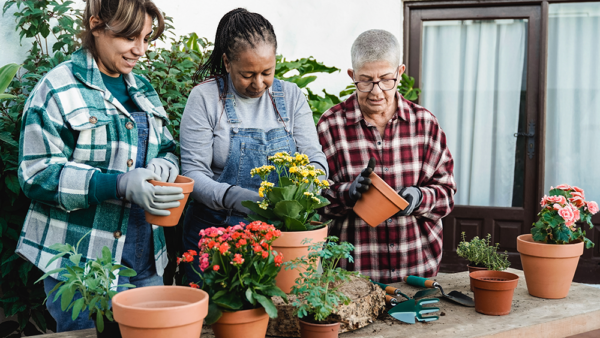
Cultivating a garden knows no age limit! For seniors, nurturing a vibrant green space offers a wealth of benefits: connection to nature, a sense of accomplishment, and maybe even some homegrown goodies for the table. But traditional gardening can be tough on the body. Bending, kneeling, and lugging heavy bags of soil – not exactly a walk in the park!
Three Tips to Make Gardening Easier for Seniors
The good news? There are plenty of ways to change your gardening routine to keep it enjoyable. Utilize our tips below to create a comfortable, accessible, and productive garden.

1.Make it Easy on Yourself
Bending over to weed and water can be a pain in the back. Raised garden beds and containers allow you to garden at a comfortable height, eliminating the need for all that back-breaking bending. Plus, containers can be easily moved around to create the perfect sunny spot for your plants.
Ditch the uncomfortable kneeling pads and aching back! Invest in a sturdy, adjustable garden stool or chair. Look for one with a wide base and good back support, so you can relax and enjoy the scenery while you tend to your plants. Nobody enjoys sunburn and as we age our skin becomes more sensitive to the sun. So, when you’re working outdoors, be sure to wear a wide-brimmed hat, protective clothing, and sunscreen to keep yourself cool and comfortable.
Heavy tools can put a strain on your body. Instead, opt for lightweight tools made from aluminum or wood. Look for ergonomic grips that are easy to hold and reduce hand fatigue. Watering your garden can be a chore, but there’s a way to make it easier! Invest in a drip irrigation system or soaker hose. These systems deliver water directly to the roots of your plants, saving you time and effort.
2.Plant Smart
Skip the annuals that require yearly planting. Choose perennials that come back year after year, reducing your workload and providing lasting beauty. Select plants known for their drought tolerance and minimal pest problems. This means less time spent watering and weeding, and more time enjoying your flourishing garden.
3.Embrace the Community
Team up with a friend, neighbor, or family member to share the gardening load. You can split tasks, offer support, and enjoy the social aspect of gardening together. Consider joining a community garden. This is a fantastic way to meet like-minded people, share resources, and benefit from the knowledge and experience of others.

Blooming Benefits for Seniors
Beyond the joy of nurturing life and the beauty of a flourishing garden, gardening offers a wealth of benefits specifically for seniors. Sunlight exposure during gardening increases Vitamin D production, a natural mood elevator. The act of caring for plants itself is therapeutic, providing a sense of purpose and accomplishment.
Studies suggest gardening may help reduce the risk of dementia. The planning, planting, and tending needed for a garden stimulates memory and attention span, keeping the mind active and engaged. Gardening provides gentle exercise, promoting heart health and flexibility. Activities like kneeling, squatting, and digging improve circulation and reduce the risk of falls.
Gardening with others fosters a sense of community and belonging. Community gardens or gardening clubs offer opportunities to socialize and share a love of nature with like-minded people. So why not try it? With a little creativity and these helpful hacks, you can keep your green thumb thriving for years to come!
A Garden for Everyone:
Want to connect with your neighbors and grow something beautiful together? Learn how our communities use gardening to bring people closer! Reach out to us to find out more.
Remember, gardening should be a source of joy and relaxation. Don’t be afraid to adapt your approach to fit your needs and abilities. With a little creativity and these helpful hacks, you can keep your green thumb thriving for years to come!



